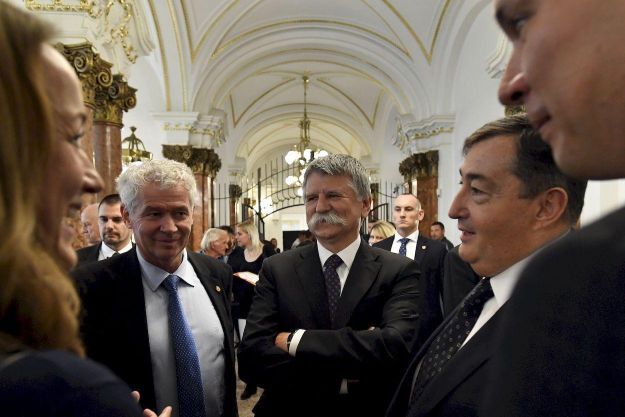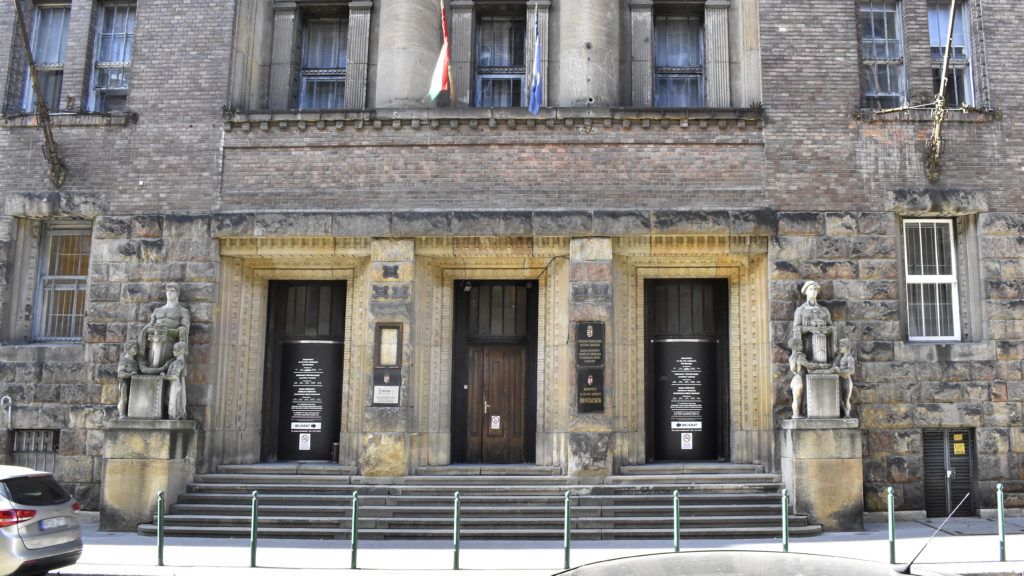Although NGOs have been demanding for almost a decade, the government has only now taken steps to allow more effective prosecution of corruption - in the hope of receiving money from the EU’s Recovery and Resilience Fund. Soon, anyone who wants to take the role of a prosecutor in a stalled investigation will be able to do so. A new bill to amend the Criminal Procedure is a step forward, but it also hides a number of pitfalls for citizens who want to fight corruption. And the new rules will put judges at the Budapest Regional Court (Fővárosi Törvényszék) under unprecedented social and political pressure in addition to an increased caseload.
KÖZELEDIK A VÁRVA-VÁRT BÜNTETŐELJÁRÁSI REFORM (magyar)

Prosecutor General Péter POLT along with the speaker of the National Assembly László KÖVÉR and PM ORBÁN's crony Lőrinc MÉSZÁROS
It seems that the Orbán government has finally given in and is about to change the Criminal Procedure (CP) that has given the prosecution monopolized by the state unlimited power to stop or derail the investigation of corruption cases. The amendment is one of the laws drafted ‘in order to reach an agreement with the European Commission.’ Since last year, no agreement has been reached with the EC on the conditions for Hungary's access to the EU's Recovery and Resilience Fund (RRF). The Commission's position has been clear. As it pointed out in its 2022 Rule of Law Report:
‘The lack of a robust track record of investigations of corruption allegations concerning high-level officials and their immediate circle remains a serious concern, although some new high-level corruption cases have been opened. The lack of judicial review of decisions not to investigate and prosecute corruption remains a cause of concern, in particular in an environment where risks of clientelism, favouritism and nepotism in high-level public administration remain unaddressed.’
The EC therefore did not see any guarantee that EU funds would be used in Hungary properly and that EU interests would be protected by prosecuting misuses effectively. Furthermore, in April 2022, the EC sent a formal notice within the financial conditionality mechanism to the Hungarian government with its corruption and rule of law concerns. This was the first time in the EU's history that the so-called conditionality mechanism had been invoked.
As Always, No Public Consultation
Although the government submitted the justice reform with another bill on law making, which is about to provide for safeguards for making public consultation meaningful, the CP reform was submitted to the Parliament without any prior consultation. NGOs, which have been calling for a reform of the prosecution's powers for years, have also just been informed of the proposal when checking the agenda of the Parliament.
Key Changes
The bill fundamentally changes the means of fighting corruption. Under the prevailing rules, if an investigation into a corruption case is terminated, the person who reported the crime had no remedy and had to accept that the police, which is under the control of the Ministry of Interior, or the prosecutor's office headed by Mr Peter POLT found that no crime had been committed.
The current government is not the one that invented these rules: they were already in force before 2010.
The proposed changes mean that if a crime report is dismissed or an investigation is closed, anyone can request a review of the case.
Investigations are not open to the public, therefore, to make a review request possible, a summary of the decision terminating the case will be published on an official website. The summary will be anonymised and will contain only the most important information about the decision. Anyone wishing to intervene will also be able to see the full decision and the list of documents produced in the case only in an anonymised way. Based on these three documents, anyone can decide to file a review request. If the prosecution does not grant the request, it is ultimately up to a court to decide whether an investigation is necessary. If the court sends the case back for investigation but the prosecution still sees no point, the court informs the requester that an indictment can be lodged with the court. By this way, the requester can take the role of the prosecutor. The court examines the indictment and, if it meets the formal requirements, declares it as admissible and sends it to the defendant.
Prosecution Services Remains a Key Player
If someone manages to reach court, they can play the role of the prosecutor, and Mr POLT’s prosecution has no say in the prosecution. However, the role of the prosecution remains crucial.
1) Framing the Case
During an investigation, state bodies assess the facts and decide on how the case can be characterized. If the case is assessed as a crime, but not as a ‘major crime concerning the exercise of public authority or management of public funds,’ no summary shall be published and the public will not be informed about the closed case at all. A summary must be published though if the person making the crime report referred in the report explicitly to ‘major crime concerning the exercise of public authority or management of public funds.’ However, if the case was initiated ex officio, there is no such restriction and the prosecutor's office may characterize the facts as not requiring the publication of a summary.
Under the new rules, for many corruption related cases, no summary will be required:
- non qualified cases of active corruption
- non qualified cases of passive corruption
- ‘abuse of authority’ in case of a perpetrator having no superior position in public administration
- in case of public funds or of funds managed by public interest trusts with a value of less than or equal to HUF 5 million
- embezzlement
- fraud, economic fraud
- defalcation
- non qualified cases of budget fraud
2) Prosecutorial Discretion
A summary is not required to be published if there are multiple crimes dealt in one procedure and the prosecution considers the corruption to be less relevant to the other, more serious crimes. Also, the public will not be informed of cases where the case is closed because the suspect is cooperating with the prosecution, for example, by providing information for other cases. If the prosecutor's office decides that the suspect has committed the crime, but the crime is no longer considered dangerous in a criminal sense, it may reprimand the suspect (‘warning’) instead of bringing the perpetrator to court. In such cases, the proceedings will be concluded without the possibility of a review request.
Budapest Regional Court Under Pressure
Regardless of whether it is about a case from the capital, Eastern or Northern Hungary, review requests from all over the country are ultimately decided before one single court. The Budapest Regional Court’s investigative judges sitting as a single judge are called upon to decide whether an investigation is necessary or not. According to the explanatory memorandum of the bill, case concentration is necessary to ensure the uniformity of jurisprudence. In addition to making a disproportionately high caseload for the Court, placing all cases in a single body, increases the risk of justice being influenced by unlawful interferences. The risk of interference is also increased by the fact that the court decides on the basis of the file without a hearing, and that there is no possibility of appeal against the decision.
It is obviously easier to put pressure on one court than on several courts in different parts of the country.

Budapest Regional Court's building where investigative judges serve
It is worth noting that it was the Budapest Regional Court whose current president allegedly promised the leader of the National Order of Judicial Officers, Mr György SCHADL, who is now waiting for trial in a high profile corruption case related to justice, that he could
‘make a fellow judge feel uncomfortable at work,’
if SCHADL wishes so.
If the Budapest Regional Court (after a repeated review, i.e. after the investigation has been closed twice) has concluded that there is room for an indictment, the case is no longer adjudicated by this court, but by a court competent for the case pursuant to the general rules.
Uphill Sprint with Hurdles
The procedure is packed with rules that impose more hurdles on citizens than the general rules of criminal procedure.
1) A Review Request Must Be Developed and Filed In a Few Days
The summary of the dismissal of the case will only be published for 15 days. There is no requirement that the information be available after 15 calendar days. In practice, therefore, it takes 11 working days to recognise that the case described in the summary is important, to find a lawyer and to draft a request.
〉The submission deadline of a review request should be extended
〉The summaries should be available in the archives beyond the above deadline.
〉The official site shall indicate what happened to the case: whether a review request was filed, how the prosecution and the Budapest Regional Court decided.
2) Limited Access to Case Information
By invoking privacy rights, the government would give citizens only limited access to the case files. The person planning to make a review would only have access to the anonymised decision and the list of the documents in the case file. Even these may only be accessed if the request is made within 10 days of the publication of the summary. The document request must be completed within 3 days, i.e. by the 13th day after publication. This rule leaves two days for anyone wishing to file a review request. In the documents, not only personal data but also the names of companies and public institutions must be hidden. Therefore, if a person wishes to lodge a review in a case that was initiated ex officio, the requester can only start writing the review based on this limited information, provided by a body which has been shown the lack of interest in investigation.
〉At least the names of the legal entities must be disclosed in the anonymised decision.
3) Urgent Need for a Lawyer
Representation by an attorney is mandatory at all stages of the new procedure. Anyone who wants to defend public funds must therefore retain a lawyer. Under the general legal aid law, if a person cannot afford a lawyer, the Hungarian state will provide him or her with a lawyer. Under the government's proposal, the state will not provide such assistance in corruption cases, so active citizens will have to hire lawyers at their expense. And if the court acquits the defendant, the requester will be obliged to pay the fees of the defendant's lawyer, too.
〉No constitutional rationale can be identified to justify an exception to the general legal aid rules, and therefore legal aid must be provided pursuant to the general eligibility criteria. The consequence of the government proposal would be that only wealthy people would be able to act in corruption cases.
4) Co-operation Forced
If several people have successfully filed a review request, they must agree before the court who will act on behalf of the prosecution. If they cannot agree, the court will appoint a representative, taking into account who has the support of the largest number of requesters. There is nothing to prevent opponents to the investigation (e.g. cronies of the government) from filing a request. By doing so they might constitute the majority of the requesters. In this case, it is conceivable that the prosecution will ultimately be represented by a person seeking the acquittal of the defendant. And if the defendant is acquitted, he or she can no longer be prosecuted for the same crime.
〉Right to appeal against the decision on appointment shall be ensured.
5) Anti-corruption NGOs Excluded
Under the new law, only individuals are entitled to file a review request and indict someone. This means that neither public bodies nor anti-corruption NGOs can step up. So, even if an association or a foundation has in its articles of association that it fights corruption and makes public interest litigation, the only people who can act are the NGOs’ staff - as private individuals. This means that, for example, if K-Monitor wants to act in a dismissed case, a K-Monitor employee must provide the authorities with a number of personal details, including his or her home address, when submitting the review request.
〉Persons eligible to file an indictment should be broadened.
〉Individual requesters should only need to provide the authorities with their name and official contact details.
〉It is necessary to ensure that the suspect or defendant can only get access to the name of the individual requesting the review, not the place of his or her address or other personal data.
6) Always Present in Person Before Court
Those who succeed in getting their indictment admitted by the court must be present in person at all hearings, alongside their lawyer. If someone fails to appear and does not justify the absence prior the hearing, the court will be obliged to terminate the proceedings. So anyone who wants to pursue a corruption case must take time off work.
〉As legal representation is mandatory, it is not necessary for the requester to permanently appear in court. The court should be allowed to decide for itself whether it considers it necessary to summon the requester.
7) No Right to Appeal
A person defending public funds may not appeal against the dismissal of the indictment or the acquittal of the defendant, nor might be submitted any extraordinary legal remedies. Therefore, if the defendant is acquitted, the proceedings remain at first instance.
〉Taking into account that, upon an ineffective investigation, the requester has much less leeway to present evidence in court proceedings, the right to appeal should also be granted to the requester. The fact that the prosecution has not found a crime does not justify that the trial should remain at a single instance.
8) Communication in Pubic Forbidden
During the whole procedure, not only personal data indicated in the case, but any document may not be disclosed. If the requester violates this, unlike the general rules of CP, the court is obliged to exclude the requester from the proceedings, and the proceedings shall be terminated. Therefore, anyone who tries to communicate publicly in a public interest case about a proceeding should expect that the proceeding will be terminated as a result.
〉There is no reasonable justification why the CP's general rules on data protection and file management should not apply in this procedure. A breach of the general CP rules may lead to procedural fines or even civil and criminal liability. The general rules are therefore sufficient in this new procedure.
〉Moreover, the public's right to be informed is disproportionately restricted by the rule that the court is obliged to terminate the proceedings.
Conclusion
-
In conclusion, the bill amending the CP is a step forward to be welcomed, but it also shows the lack of real commitment to create a strong tool against high level corruption.
-
The amendment puts more social and political pressure on the courts which have fought for their independence since the Orbán government had tried to interfere in justice many times since 2010, increasing the number of politically loyal judges among court leaders.
-
Furthermore, the bill creates a number of obstacles for those who act to protect public funds. It is a time-consuming, legally demanding and costly procedure for anyone who wants to pursue corruption.
-
It is still important to stress that it is not for active citizens to carry out, at their own expense and on their own time, the service that the prosecution service supposed to do.
-
Moreover, it cannot be ruled out that after the adoption of the law and the use of the RRF, the government or one of its cronies may challenge the law before the Hungarian Constitutional Court (HCC), for example on the grounds of the defendant’s right to a fair trial. If HCC annuls the law, the government could easily pull the sovereignty or constitutional identity card against the EC’s rule of law toolbox.
Címkék: english EU conditionality
Szólj hozzá!
A bejegyzés trackback címe:
Kommentek:
A hozzászólások a vonatkozó jogszabályok értelmében felhasználói tartalomnak minősülnek, értük a szolgáltatás technikai üzemeltetője semmilyen felelősséget nem vállal, azokat nem ellenőrzi. Kifogás esetén forduljon a blog szerkesztőjéhez. Részletek a Felhasználási feltételekben és az adatvédelmi tájékoztatóban.





